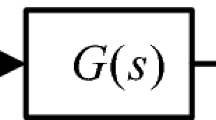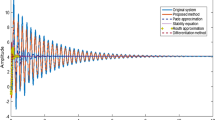Abstract
In a modern power system, there is often large difference in the decay speeds of transients. This could lead to numerical problems such as heavy simulation burden and singularity when the traditional methods are used to estimate the stability region of such a dynamic system with saturation nonlinearities. To overcome these problems, a reduced-order method, based on the singular perturbation theory, is suggested to estimate the stability region of a singular system with saturation nonlinearities. In the reduced-order method, a low-order linear dynamic system with saturation nonlinearities is constructed to estimate the stability region of the primary high-order system so that the singularity is eliminated and the estimation process is simplified. In addition, the analytical foundation of the reduction method is proven and the method is validated using a test power system with 3 buses and 5 machines.
Similar content being viewed by others
References
Hu T, Lin Z, Chen B M. An analysis and design method for linear systems subject to acturator saturtion and disturbance. Automatica, 2002, 38(2): 351–359
Hindi H, Boyd S. Analysis of linear systems with saturation using convex optimization. In: Proceedings of the 37th IEEE Conference on Decision & Control. New York: Piscataway NJ, 1998. 903–908
Cao Y, Lin Z, Ward D G. An anti-windup approach to enlarging domain of attraction for linear systems subject to actuator saturation. IEEE Trans Autom Contr, 2002, 47(1): 140–145
Crow M L, Ayyagari J. The effect of excitation limits on voltage stability. IEEE Trans Circ Syst-I, 1995, 42(12): 1022–1026
Ji W, Venkatasubramanianian V. Hard-limit induced chaos in a fundamental power system model. Intern J Electr Power Energy Syst, 1996, 18(5): 279–295
Escarela-Perez R, Niewierowicz T, Campero-Littlewood E. A study of the variation of synchronous machine parameters due to saturation: A numerical approach. Electr Power Syst Res, 2004, 72(1): 1–11
Xi Z, Feng G, Cheng D, et al. Nonlinear decentralized saturated controller design for power systems. IEEE Trans Contr Syst Tech, 2003, 11(4): 539–547
Gan D Q, Qu Z H, Cai H Z. Multi-machine system excitation control via theories of feedback linearization control and nonlinear robust control. Inter J Syst Sci, 2000, 31(4): 519–527
Yu Y X, Jia H J, Wang C S. Chaotic phenomena and small signal stability region of electrical power systems. Sci China Ser E-Tech Sci, 2001, 44(2): 187–199
Rajkumar V, Mohler R R. Nonlinear control methods for power systems: A comparison. IEEE Trans Contr Syst Tech, 1995, 3(2): 231–237
Lu Q, Sun Y Z, Mei S W. Nonlinear Control Approach and Implementation in Power System Dynamics. Boston: Kluwer Academic Publishers, 2001. 68–76
Hu T, Lin Z. Control Systems with Actuator Saturation: Analysis and Design. Boston: Birkhauser, 2001. 157–191
Dobson I, Lu L. Voltage collapse precipated by the immediate change in stability when generator reactive power limits are encountered. IEEE Trans Circ Syst-I, 1992, 39(9): 762–766
Gutman P O, Hangander P. A new design of constrained controllers for linear systems. IEEE Trans Autom Contr, 1985, 30(1): 22–33
Venkatasubramanian V. Stability boundary analysis of nonlinear dynamics subject to state limits. In: Proceedings of the 34th Hawaii International Conference on System Science. Los Alamitos: IEEE Computer Society, 2001. 1–6
Hu T S, Lin Z L. Exact characterization of invariant ellipsoids for single input linear systems subject to actuator saturation. IEEE Trans Autom Contr, 2002, 47(1): 164–169
Xin H, Gan D, Chung T S, et al. A method for evaluating the performance of PSS with saturated input. Electr Power Syst Res, 2007, 77(10): 1284–1291
Tse C T, Wang K W, Chung C Y, et al. Robust PSS design by probabilistic eigenvalue sensitivity analysis. Electr Power Syst Res, 2001, 59(1): 47–54
Kokotovic P V, Khalil H K, O’Reilly J. Singular perturbation methods in control: Analysis and design. London: Academic Press, 1986. 47–68
Singh H, Brown R H, Naidu D S, et al. Robust stability of singularly perturbed state feedback systems using unified approach. IEE Proc Contr Theory Appl, 2001, 148(5): 391–396
Kundur P. Power system stability and control. New York: McGraw-Hill, 1994. 315–335
Liu Y Q, Yan Z, Ni Y X. Study on the order reduction of two-time scale power system dynamic models. I. Power system singular perturbation model. Autom Electr Power Syst (in Chinese), 2002, 26(18): 1–5
Hu T S, Lin T L. Exact characterization of invariant ellipsoids for single input linear systems subject to actuator saturation. IEEE Trans Autom Contr, 2002, 47(1): 164–169
Ni Y X, Chen S S, Zhang B L. Theories and Analysis of Dynamic Power Systems (in Chinese). Beijing: Tsinghua University Press, 2002, 235–251
Khalil H K. Nonlinear Systems. 2nd ed. New Jersey: Prentice Hall, 1996. 78–81
Xin H H. An study on the impact of parameter uncertainties and saturation nonlinearities on power system stability. Doctoral Dissertation (in Chinese). Hangzhou: Zhejiang University, 2007. 97–123
Author information
Authors and Affiliations
Corresponding author
Additional information
Recommended by Prof. LU Qiang, member of Editorial Committee of Science in China, Series E: Technological Sciences
Supported by the National Natural Science Foundation of China (Grant No. 50595411) and the New Century Outstanding Investigator Program of the Ministry of Education (Grant No. NCET-04-0529)
Rights and permissions
About this article
Cite this article
Gan, D., Xin, H., Qiu, J. et al. A reduced-order method for estimating the stability region of power systems with saturated controls. SCI CHINA SER E 50, 585–605 (2007). https://doi.org/10.1007/s11431-007-0073-6
Received:
Accepted:
Issue Date:
DOI: https://doi.org/10.1007/s11431-007-0073-6




